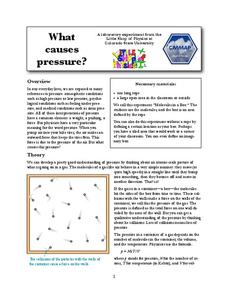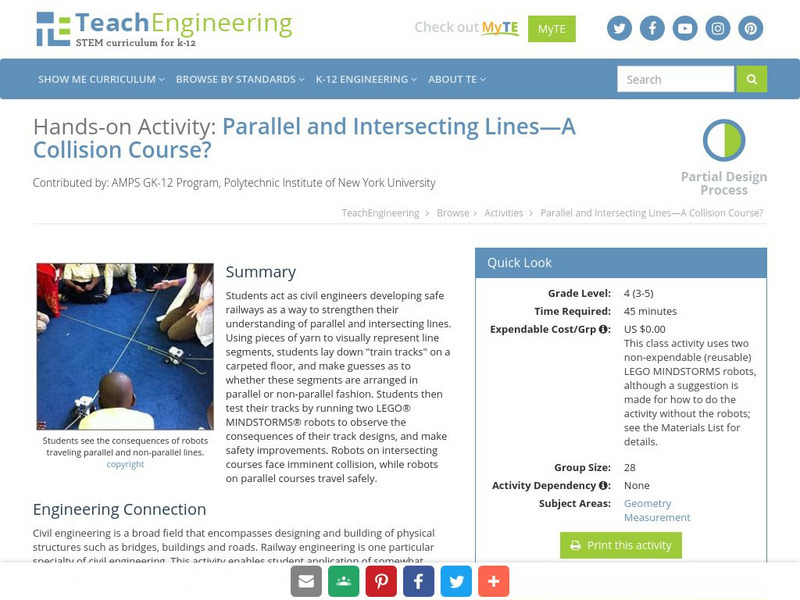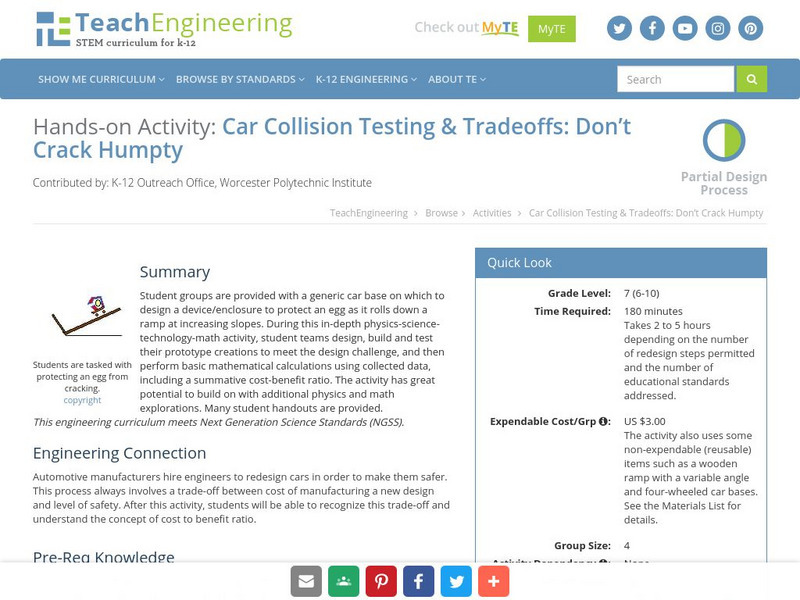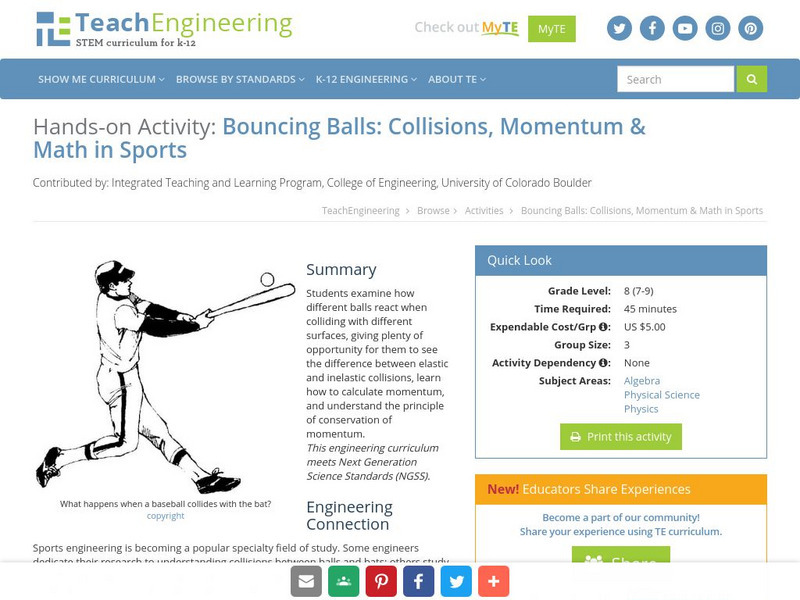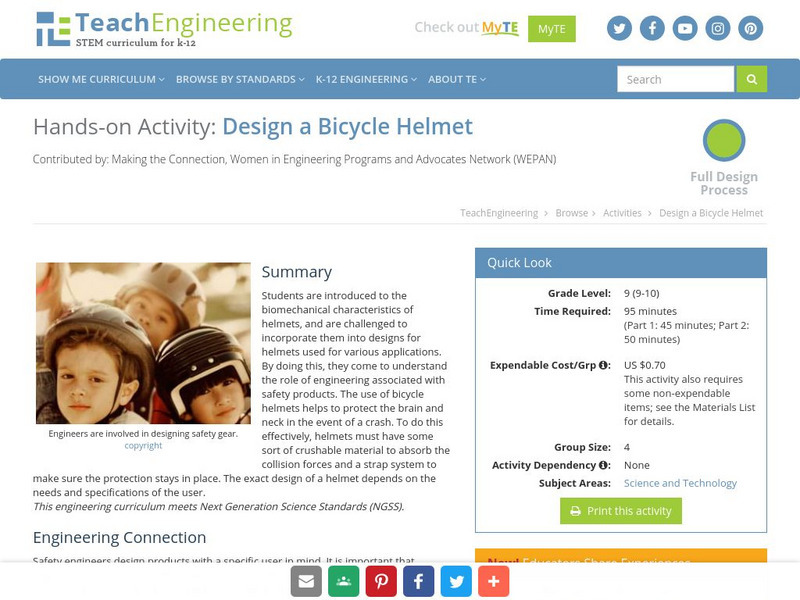Hi, What do you want to do?
ResourcesWeb & Docs
MediaVideo & Audio
CollectionsLessons & Topics
AI Teacher ToolsInstruction & Ideas
newFilter
31 results:
collisionClear All
It's About Time
Concentrating on Collisions
How important is momentum? Pupils investigate and apply the definition of momentum as they conduct analyses during a series of one-dimensional collisions. They infer the relative masses of two objects by carefully staging and predicting...
National Science Teachers Association
Paper Car Crash Design
High school physical scientists collide with motion. They work in pairs to design a paper car that will protect a raw egg during a head-on collision. Measurements of distance traveled, time of run, vehicle specs, and photo gate flags are...
It's About Time
Conservation of Momentum
Assist your class with understanding collisions as they apply the Law of Conservation of Momentum. Pupils measure the momentum before and after manipulation of two objects so that one strikes another in an inelastic collision. The lesson...
Teach Engineering
Incoming Asteroid! What's the Problem?
Oh, no! An asteroid is on a collision course with Earth!. Class members must rise to the challenge of designing a shelter that will protect people from the impact and permit them to live in this shelter for one year. In this first lesson...
Illustrative Mathematics
Bank Shot
Young geometers become pool sharks in this analysis of the angles and lengths of a trick shot. By using angles of incidence and reflection to develop similar triangles, learners plan the exact placement of balls to make the shot....
Teach Engineering
Bouncing Balls
How high will it bounce? Groups determine the height different balls bounce off of different surfaces. By performing the necessary calculations, they determine the initial and final momentum of the balls. The included worksheet provides...
Colorado State University
What Causes Pressure?
Are you feeling the pressure? Let loose a little with a kinesthetic activity that models molecular motion in a closed space! The activity varies conditions such as volume and temperature and examines the effects on molecules.
Teach Engineering
Ramp and Review (for High School)
Rolling for momentum. As part of a study of mechanical energy, momentum, and friction, class members experiment rolling a ball down an incline and having it collide with a cup. Groups take multiple measurements and perform...
Science Friday
Make a Model Eardrum to Detect Sound Waves
Make sound waves visible with an experiment that asks middle schoolers to build a model ear drum using plastic bottles, rubber bands, plastic wrap, and sand-like substances.
It's About Time
Accidents
Did you know that cars weren't designed for passenger safety until the 1960s? The lesson starts with a quick quiz on automobile safety. Then, scholars evaluate three cars for their safety features. This is the third in a set of nine...
Serendip
Diffusion and Cell Size and Shape
Is your class ready to size up the topic of diffusion? Help them get cell shape savvy with a well-written handout. The resource covers how substances such as oxygen passively move through the cell membrane and how cell size and shape...
Perkins School for the Blind
Safety Crash Testing
Everyone knows that cars have safety features, but wouldn't it be fun to design your own? Learners with visual impairments build a ramp and then attempt to use the material provided to design a safety system to protect a raw egg from a...
Khan Academy
Khan Academy: Inelastic Collision Review
Review the key concepts and skills for inelastic collisions. Understand how to determine if a collision is elastic or inelastic.
PBS
Pbs Learning Media: Wgbh: Collisions on an Air Track
Set variables for a simulated collision and observe the changes in reaction between two carts. Options include changing the weight of one cart and the type of collision to occur.
TeachEngineering
Teach Engineering: Parallel and Intersecting Lines: A Collision Course?
Students act as civil engineers developing safe railways as a way to strengthen their understanding of parallel and intersecting lines. Using pieces of yarn to visually represent line segments, students lay down "train tracks" on a...
TeachEngineering
Teach Engineering: Car Collision Testing & Tradeoffs: Don't Crack Humpty
Student groups are provided with a generic car base on which to design a device/enclosure to protect an egg as it rolls down a ramp at increasing slopes. During this activity, student teams design, build and test their prototype...
Other
Lancaster University: Particle Physics Package
A collection of experiments, projects, and articles that will help students understand particle collision and mass, kinetic energy, magnetic field, the Large Hadron Collider, and detection of the Higgs particle.
Concord Consortium
Concord Consortium: Molecular Workbench Showcase: Chemistry, Reactions
Simulations that can help students visualize and understand concepts in chemistry like the collision theory, chemical reaction equilibrium, and polymerization.
NASA
Nasa: Hubble Observations Shed Light on Jupiter Impact
Scientists continue to learn from their observations long after the largest collision in history was recorded. Was Comet SL-9 actually an asteroid? What were the dark impact clouds made of? What were the effects on Jupiter's magnetic field?
TeachEngineering
Teach Engineering: Bouncing Balls
Students examine how different balls react when colliding with different surfaces, giving plenty of opportunity for them to see the difference between elastic and inelastic collisions, learn how to calculate momentum, and understand the...
Read Works
Read Works: Crash Test
[Free Registration/Login Required] An informational text about a scientist who studies collisions. A question sheet is available to help students build skills in reading comprehension.
Annenberg Foundation
Annenberg Learner: Colliding Cars
Try to predict what will happen in three different bumper car collisions. For each collision, you'll be shown two possible outcomes.
PBS
Pbs: American Experience: Rescue at Sea
Companion website to the PBS documentary on the collision of two ships in 1909 and the reliance on the newly invented telegraph for rescue.
TeachEngineering
Teach Engineering: Design a Bicycle Helmet
The goal of the activities is for students to understand the basics of engineering associated with safety products. Using a bicycle helmet helps to protect the brain and neck during a crash. In order to do this effectively, helmets must...






